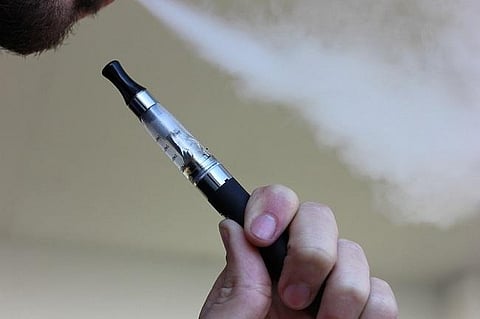

The Union government is cracking down on e-cigarettes, vapes and nicotine-flavoured e-hookah in an ordinance passed on Wednesday. Speaking to the media, Finance Minister Nirmala Sitharaman said that the Union cabinet approved the ban on production, manufacture, import/export, transport, sale, distribution, storage and advertisement related to e-cigarettes. These were also listed as non-cognisable offenses.
Violation of the norms can result in a fine of Rs 1 lakh, one-year imprisonment or both. If it is a repeat offence, the punishment is higher with three years imprisonment and a fine of Rs 5 lakh.
“E-cigarettes got promoted initially as a way for people to get out of the process of smoking cigarettes. It was meant to be a weaning process to get out of smoking cigarettes. Reports say that many people are no longer using it as a weaning method but some getting into the habit of using e-cigarettes because it’s cool,” Nirmala Sitharaman said.
Nirmala maintained that e-cigarettes are being marketed as hassle-free devices, which can be charged like mobile phones and used easily. “You don’t have a match stick. You can just charge it like a mobile phone. The cartridge that they use can be used and thrown away. It’s like a pen. If you don’t have cartridges, you can use it like disposable ball pens.”
She noted that there are around 400 brands and over 150 flavours, but though there are several models available on the market, none are produced in India.
Stating that the odourless nature of e-cigarettes is attracting the youth to pick up the device, Nirmala maintained that the Union government had decided to ban e-cigarettes in order to “avoid risking the health of the youth”.
“Studies have shown that the smoke, which is exhaled from e-cigarettes, contain high levels of nicotine and this affects people who passively smoke it on a much larger scale. It has already caused concerns in the US and several European countries.”
As of Wednesday, it was reported that seven people had died in the US because of a vaping-related illness.
“The cabinet thought it’s time to immediately take a decision so the young people’s health is not at risk. An ordinance has been passed and the issue will be raised in the Parliament,” she added.
On September 9, the US Food and Drug Administration had issued a warning letter to Juul Labs, the company that manufactures and sells the popular e-cigarette brand. The FDA had accused Juul Labs of falsely promoting that e-cigarettes are safer than traditional cigarettes. FDA’s warning came after the agency had launched a probe into the outbreak of deadly lung-related diseases in the US due to e-cigarettes.
The move came as the US Centers for Disease Control and Prevention (CDC) said that it was investigating five deaths in California, Illinois, Indiana, Minnesota and Oregon, all associated with use of vaping products, BBC reported.
The dialogue surrounding the ban on e-cigarettes has grown exponentially in India, ever since the union Health Department had issued an advisory in August 2018, to ban e-cigarettes. In February this year, after Lokesh Jain, one of the directors of Litejoy International Private Limited, an international manufacturer of e-cigarettes, countered the claim and filed a PIL with the Delhi High Court. In March this year, the court had issued a stay order on the advisory, thereby necessitating the Union government to issue an ordinance.
The Union government’s decision comes after several states including, Punjab, Maharashtra, Karnataka, Kerala, Bihar, Uttar Pradesh, Jammu & Kashmir, Himachal Pradesh, Tamil Nadu, Puducherry and Jharkhand had previously banned e-cigarettes. However, despite the ban, these states lack effective implementation of the ban as the use of e-cigarettes continued to grow.
Although, there has been no study regarding the long-term effects of e-cigarettes, the deaths allegedly due to e-cigarettes in the US and several European countries had several researchers to claim that it causes an impediment to brain development and learning in young adults and also cause mood swings and anxiety.